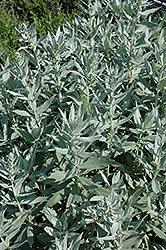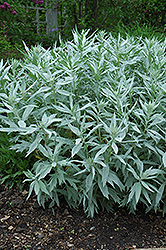Height: 5 feet
Spread: 3 feet
Sunlight:
![]()
Hardiness Zone: 3
Other Names: Sage, Wormwood
Description:
Beautiful fragrant, silvery foliage and creamy white flowers are showcased in this selection; an upright mounded habit, excellent for garden beds or large containers; drought tolerant once established; prune in fall to keep compact and shapely
Ornamental Features
White Mugwort's attractive tomentose narrow leaves emerge silver in spring, turning dark green in color throughout the season on a plant with an upright spreading habit of growth. It features bold spikes of creamy white flowers rising above the foliage in late summer. The flowers are excellent for cutting.
Landscape Attributes
White Mugwort is an herbaceous perennial with an upright spreading habit of growth. Its medium texture blends into the garden, but can always be balanced by a couple of finer or coarser plants for an effective composition.
This plant will require occasional maintenance and upkeep, and is best cleaned up in early spring before it resumes active growth for the season. Deer don't particularly care for this plant and will usually leave it alone in favor of tastier treats. It has no significant negative characteristics.
White Mugwort is recommended for the following landscape applications;
- Mass Planting
- General Garden Use
Planting & Growing
White Mugwort will grow to be about 4 feet tall at maturity, with a spread of 3 feet. It tends to be leggy, with a typical clearance of 1 foot from the ground, and should be underplanted with lower-growing perennials. It grows at a fast rate, and under ideal conditions can be expected to live for approximately 10 years. As an herbaceous perennial, this plant will usually die back to the crown each winter, and will regrow from the base each spring. Be careful not to disturb the crown in late winter when it may not be readily seen!
This plant should only be grown in full sunlight. It prefers to grow in average to moist conditions, and shouldn't be allowed to dry out. It is not particular as to soil type or pH, and is able to handle environmental salt. It is highly tolerant of urban pollution and will even thrive in inner city environments. This species is not originally from North America. It can be propagated by division.

